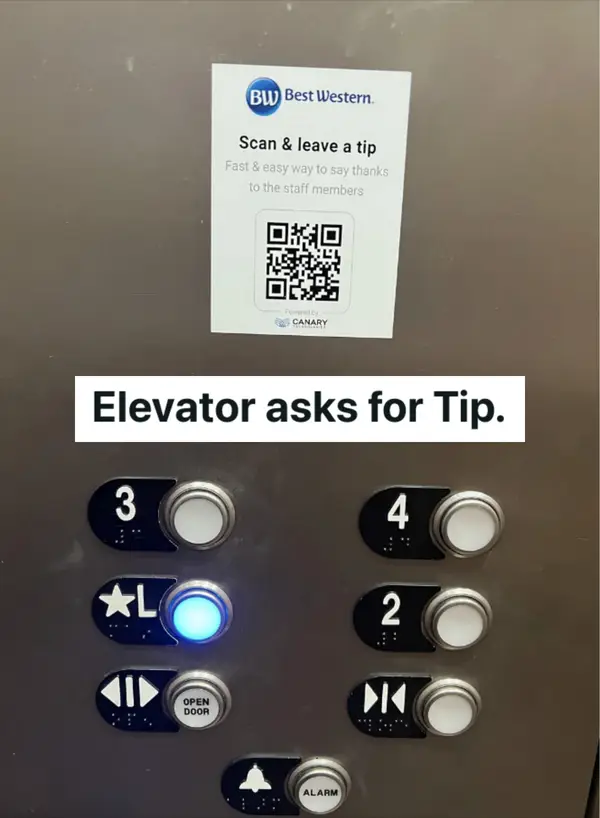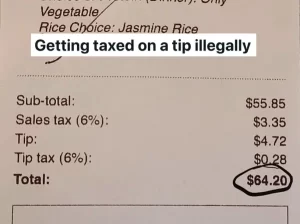
(they even tax something that God is responsible for.)
Tipping fatigue is real, and you’re not alone in feeling overwhelmed by constant tip requests. As digital payment systems spread across retail stores, coffee shops, and even self-checkout stations, customers are increasingly frustrated with expanded tipping expectations.
Recent data reveals that 59% of American adults view tipping negatively, with over one-third believing tipping culture has spiraled out of control. The good news? Etiquette experts agree that many of these new tip prompts are suggestions, not obligations.
Understanding the Rise of Tip Prompts
The pandemic fundamentally changed tipping behavior. Customers began tipping more generously to support struggling workers, creating new expectations that persisted even as businesses reopened. Additionally, the widespread adoption of point-of-sale systems like Toast and Square introduced tip prompts in previously tip-free environments.
“People are being asked to tip in contexts where they have not traditionally been asked to tip, and they’re being asked to tip larger amounts in those occupations where they are used to leaving tips,” explains Michael Lynn, a tipping expert and professor at Cornell University’s School of Hotel Administration.
When You Can Skip the Tip Without Guilt
Self-Checkout and Automated Services
Never feel obligated to tip when using self-checkout kiosks or automated services. If you’re scanning, bagging, and processing your own items, no service is being provided that warrants a tip. Lynn notes this trend is particularly puzzling since “it’s not clear who’s receiving those tips.”
Takeout and Counter Service
Picking up your own food order doesn’t require a tip. Unlike food delivery, where drivers provide a service by bringing meals to your location, takeout involves minimal service interaction. The same applies to counter service at coffee shops when you’re simply ordering a cold brew or pastry.
However, etiquette expert Avery Johnson suggests considering a 10% tip for takeout orders with special requests or modifications that required extra effort from kitchen staff.
Retail Purchases
Tip prompts appearing during regular retail transactions can be safely ignored. Whether you’re buying concert merchandise, clothing, or other retail items, the act of pulling an item from a shelf or rack doesn’t constitute tip-worthy service, even when staff members are friendly and helpful.
Thomas Farley, etiquette expert known as Mister Manners, emphasizes that pleasant service doesn’t automatically create a tipping obligation: “Take it as a suggestion, not an obligation.”
Double-Tipping Situations
Watch out for restaurants that include automatic gratuity but still prompt for additional tips. Some establishments add a 20% service charge to bills while still presenting tip screens that request another 20%. This practice can result in paying 40% in total gratuities for standard service.
If you encounter this situation, ask your server to clarify the charges or request that the automatic gratuity be removed so you can tip based on service quality.
Smart Strategies for Handling Tip Pressure
Research Restaurant Policies
Before dining out, check restaurant websites or call ahead to understand their tipping policies. Many establishments clearly state whether service charges are included in their pricing, helping you avoid awkward situations at payment time.
Treat Digital Prompts as Optional
Remember that tip screens are programmed suggestions, not mandatory charges. You have every right to select “no tip” or “skip” when the service doesn’t warrant gratuity.
Focus on Service Quality
Base your tipping decisions on the actual service received rather than social pressure from digital prompts. Traditional tipping guidelines still apply: tip for personal service that enhances your experience.
The Bottom Line on Modern Tipping
Tipping fatigue is a legitimate response to the expansion of tip requests into traditionally non-tipping scenarios. While it’s important to support service workers who depend on gratuities, you’re not obligated to tip in every situation where you’re prompted.
The key is distinguishing between genuine service that merits recognition and automated prompts that businesses use to supplement wages. By understanding when tips are appropriate and when they’re optional, you can navigate modern tipping culture confidently while supporting workers fairly.
Remember, good service deserves recognition, but a tip prompt alone doesn’t create an obligation. Trust your judgment, consider the service provided, and tip accordingly—without the guilt.






